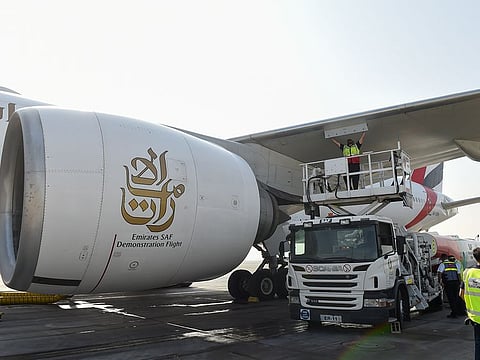Dubai’s Emirates tests first flight using 100% Sustainable Aviation Fuel
In test flight over Dubai coastline, one of Emirates’ Boeing 777-300ER ran on 100% SAF

Dubai: Dubai’s Emirates has successfully completed a demonstration test flight using 100 per cent Sustainable Aviation Fuel (SAF) on Monday. Test flight EK2646 departed from Dubai International Airport (DXB) at approximately 11.39 pm, circled the coastline for 42 minutes and returned to DXB at 12.21 pm.
The test flight took off from Dubai International Airport (DXB), was commanded by Capt. Fali Vajifdar and Capt. Khalid Nasser Akram for more than one hour over the Dubai coastline. The demonstration flight is the first one in the MENA region to run on 100 per cent SAF. Currently, SAF is approved for use in all aircraft, but only in blends of up to 50 per cent with conventional jet fuel.
This Emirates flight will also help refine the ‘playbook for future SAF demonstrations’ and support future certification where 100 per cent drop-in SAF fuel is approved for aircraft. The outcome adds to industry data and research around SAF blends in higher proportions. It could also pave the way for standardisation and future approval of 100 per cent drop-in SAF as a replacement for jet fuel – one that is well above the current 50 per cent blend limit.
Adel Al Redha, Chief Operating Officer of Emirates, said, “This flight is a positive step for our industry as we work collectively to address one of our biggest challenges - reducing our carbon footprint. Such initiatives are critical contributors to industry knowledge on SAF and provide data to demonstrate the use of higher blends of SAF for future regulatory approvals.”
Powering the engines
Emirates said it has worked alongside GE Aerospace, Boeing, Honeywell, Neste and Virent to procure and develop a blend of SAF, which replicates the properties of conventional jet fuel. “At each blend ratio, various chemical and physical fuel property measurements were carried out,” the airline said in a statement. “After multiple lab tests and rigorous trials, they arrived at a blending ratio that mirrored the qualities of jet fuel.”
Eighteen tonnes of SAF were blended, comprised of HEFA-SPK provided by Neste (hydro-processed esters, fatty acids, and synthetic paraffinic kerosene) and HDO-SAK from Virent (hydro-deoxygenated synthetic aromatic kerosene). The 100 per cent SAF supplied one GE90 engine, with conventional jet fuel supplying the other engine.
‘Year of Sustainability’
The demonstration flight powered by SAF is essential as the UAE declares 2023 the ‘Year of Sustainability’, said Emirates officials. Saif Humaid Al Falasi, Group CEO at ENOC, said Emirates’ achievement represents a significant step to reducing CO2 emissions and achieving climate neutrality. “This not only aims to accelerate the decarbonisation of the aviation sector but also contributes to achieving the UAE’s goals in climate neutrality,” said Al Falasi.
The Dubai airline already runs a comprehensive fuel efficiency program that investigates and implements ways to reduce unnecessary fuel burn and emissions wherever it is operationally feasible. Some of the program’s initiatives include ‘flex tracks’ - or flexible routings – which means partnering with air navigation service providers to create the most efficient flight plan for each flight. These efforts have been ongoing since 2003. Emirates has been working with IATA to extend this routing system globally as a Standard Operating Procedure where possible.
Emirates’ first flight powered by SAF blended with jet fuel was in 2017, operating from Chicago O’Hare airport on a Boeing 777. It received its first SAF-powered A380 delivery in 2020 and uplifted 32 tonnes of SAF for its flights from Stockholm that year.



